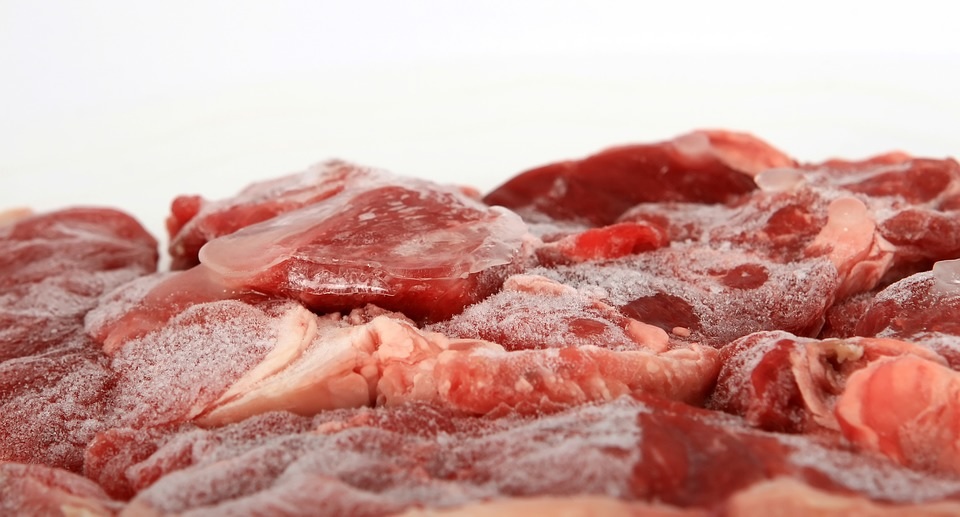A group of experts conducted research to address one of the common questions people have about COVID-19. The study revealed the virus, SARS-CoV-2, was able to survive and maintain “infectivity” for up to three weeks in various kinds of frozen meats.
COVID-19 virus survives in frozen goods for up to 3 weeks
Since COVID-19 is caused by a new virus, studies are still underway to assess other potential methods of transmission. Like the possibility of contracting the virus through air, there are still many questions on likelihood of getting infected with SARS-CoV-2 through ingestion.
The paper featured on bioRxiv reveals the result of an experiment where SARS-CoV-2 was added into 500 individual, same-sized cubes of salmon, chicken, and pork sourced from various supermarkets in Singapore. The samples were then stored at different temperatures including the recommended food storage refrigeration at 4°C while the rest were frozen at –20°C and –80°C.
Scientists removed the samples from storage to thaw after different periods ranging from 1, 2, 5, 7, 14, and 21 days. The study found that the amount of SARS-CoV-2 added onto the refrigerated and frozen goods did not change regardless of the temperature and the number of days before thawing. “Infectivity was maintained for 3 weeks in both the refrigerated (4°C) and frozen (–20°C and –80°C) samples,” the experts added.
Why people should not panic in buying frozen meats amid COVID-19
The study offers a significant hypothesis on the lingering investigation of whether or not SARS-CoV-2 could be transmitted through food consumption. But it should be noted that the proven common way of its spread remains through coming in contact with droplets produced by a COVID-19 patient.
The ability of the COVID-19 virus to survive for up to three weeks in frozen goods is not entirely surprising, too. The World Health Organization previously pointed out that the MERS-CoV, an earlier discovered type of coronavirus, was able to live for up to two years at -20°C.
It should be noted that there is no confirmed case yet of COVID-19 infection through food consumption. Reports also note that the virus is likely to be killed by stomach acids and there is no direct route for the virus to reach the lungs and replicate once it passes through the stomach and the intestine. The WHO also reported that a “quick reduction” has been observed when SARS coronavirus is exposed to heat at 56°C.
On the other hand, these points are in no way reasons to disregard food safety practices. Experts advise people to maintain proper hygiene and regular cleaning of surfaces where raw foods are being prepared as well as avoiding uncooked meals.
Feature photo by Robert Owen-Wahl on Pixabay



 Royalty Pharma Stock Rises After Acquiring Full Evrysdi Royalty Rights from PTC Therapeutics
Royalty Pharma Stock Rises After Acquiring Full Evrysdi Royalty Rights from PTC Therapeutics  Sanofi Gains China Approval for Myqorzo and Redemplo, Strengthening Rare Disease Portfolio
Sanofi Gains China Approval for Myqorzo and Redemplo, Strengthening Rare Disease Portfolio  Novo Nordisk Warns of Profit Decline as Wegovy Faces U.S. Price Pressure and Rising Competition
Novo Nordisk Warns of Profit Decline as Wegovy Faces U.S. Price Pressure and Rising Competition  GLP-1 Weight Loss Pills Set to Reshape Food and Fast-Food Industry in 2025
GLP-1 Weight Loss Pills Set to Reshape Food and Fast-Food Industry in 2025  RFK Jr. Overhauls Federal Autism Panel, Sparking Medical Community Backlash
RFK Jr. Overhauls Federal Autism Panel, Sparking Medical Community Backlash  Sanofi to Acquire Dynavax in $2.2 Billion Deal to Strengthen Vaccine Portfolio
Sanofi to Acquire Dynavax in $2.2 Billion Deal to Strengthen Vaccine Portfolio  Viking Therapeutics Sees Growing Strategic Interest in $150 Billion Weight-Loss Drug Market
Viking Therapeutics Sees Growing Strategic Interest in $150 Billion Weight-Loss Drug Market  Eli Lilly and Novo Nordisk Battle for India’s Fast-Growing Obesity Drug Market
Eli Lilly and Novo Nordisk Battle for India’s Fast-Growing Obesity Drug Market  Merck Raises Growth Outlook, Targets $70 Billion Revenue From New Drugs by Mid-2030s
Merck Raises Growth Outlook, Targets $70 Billion Revenue From New Drugs by Mid-2030s  Novo Nordisk and Eli Lilly Cut Obesity Drug Prices in China as Competition Intensifies
Novo Nordisk and Eli Lilly Cut Obesity Drug Prices in China as Competition Intensifies 































